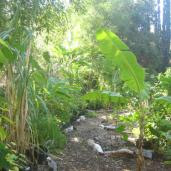Few of us ask, or ever really find out, where our electricity comes from when we switch on that light switch or run that hair dryer. I attended a Hopi gathering a while back that enlightened me on a few things on that subject.
For instance, I didn't know that coal companies, use water to wash coal hundreds of miles through pipelines to their destination. I guess it's cheaper than trucking the stuff. Not sure about that, or why they would do things that way. They might not be sure either, 'cept it's always been done that way.
The Hopi are the water people. But Hopiland, on the high mesa of Arizona, is dry. There is a certain breed of heirloom Hopi blue corn that only a few of the elders still use (per one Hopi elder I spoke with) that doesn't need much water and can grow in that ecosystem. But most of their food supply needs water which doesn't come from rain in that part of the world. They have springs to feed the people and the wildlife in the area. They have sacred springs, that have been honored and cared for, for many years.
These springs are drying up.
There are four aquifers underneath the mesa. Three of them consist of non-drinkable water that is also difficult to access. The other aquifer is drinkable - pure, decent water that can easily be accessed, and it feeds many of the springs. It is huge. Per the coal company that made a deal with the Hopi to use that aquifer for their coal mining, it is as big as an ocean - "it is so big that what the coal company will use, would be like using a cup of water from a huge lake!"
But what the coal company said about that wasn't quite true. What Peabody Coal does with the Hopi's only drinking water, their only irrigation water, the water that feeds their sacred springs and the entire ecosystem of the area, is wash coal from their coal mine in Arizona to the power plant in Laughlin, Nevada, that feeds Las Vegas and Southern California with electricity. Can you imagine how much water it takes to slurry coal hundreds of miles through a pipeline? Yeah. A lot.
Con Edison uses Peabody Coal and Hopi water to feed their grid. I don't know if DWP uses Peabody coal to feed their grid, but it is likely. My last bill informed me that in 2006, DWP got 29% of its electrical power from coal. This year, it is projected 49%.
Because Peabody Coal has become a major source of revenue for the Hopi, and because they have a lease, things are not so simple as just kicking them out. It is the age old story of outside forces coming into indigenous areas (even the paltry lands that we have left them, the worst lands in the country, the reservations), and exploiting them. Yes, the Hopi are benefiting financially, but not nearly as much as the coal company. And their lifeblood, water, their future generations' ability to survive, is being compromised in the process.
A number of the Hopi are working towards creating alternative economics for their area and bringing back old ways of using water that will preserve it for future generations.
What can you do about this?
Demand real accountability from corporations. Demand that they start paying for the true costs of doing business, including all the destruction they cause to environments, to communities, to future generations. Educate business people in your area about the concept of sustainability. We like the definition that Pachamama uses (pachamama.org): "The ability of this generation to provide for its needs, without compromising the ability of future generations to do so."
Write or call your electric company. Find out what they are doing to go green and lodge your protest on using coal slurry, or other environmentally unsound ways to create electricity.
Or you can become energy self-sufficient. Stop using monolithic "it has nothing to do with me" grid electricity that encourages, by its very structure, this type of irresponsibiliy to solve "demand."
But most importantly, continue to ask questions, like "where does my electricity come from, really?" and find the real answers. Educate yourself on alternatives to the destructive ways we maintain our lifestyle and conveniences in this country. Educate your neighbor on where their electricity is coming from. Get your schools to teach your children to ask those kinds of questions and come up with better answers than we have, and teach them these things yourselves (because depending on the schools to ensure our kids have the knowledge they need is just another "it has nothing to do with me"). Maybe if we do that, the Hopi's children, and ours, will have water to drink.
http://www.sprol.com/?p=172
http://www.ens-newswire.com/ens/apr2006/2006-04-17-06.asp
____________________
Wednesday, November 14, 2007
Subscribe to:
Post Comments (Atom)




No comments:
Post a Comment